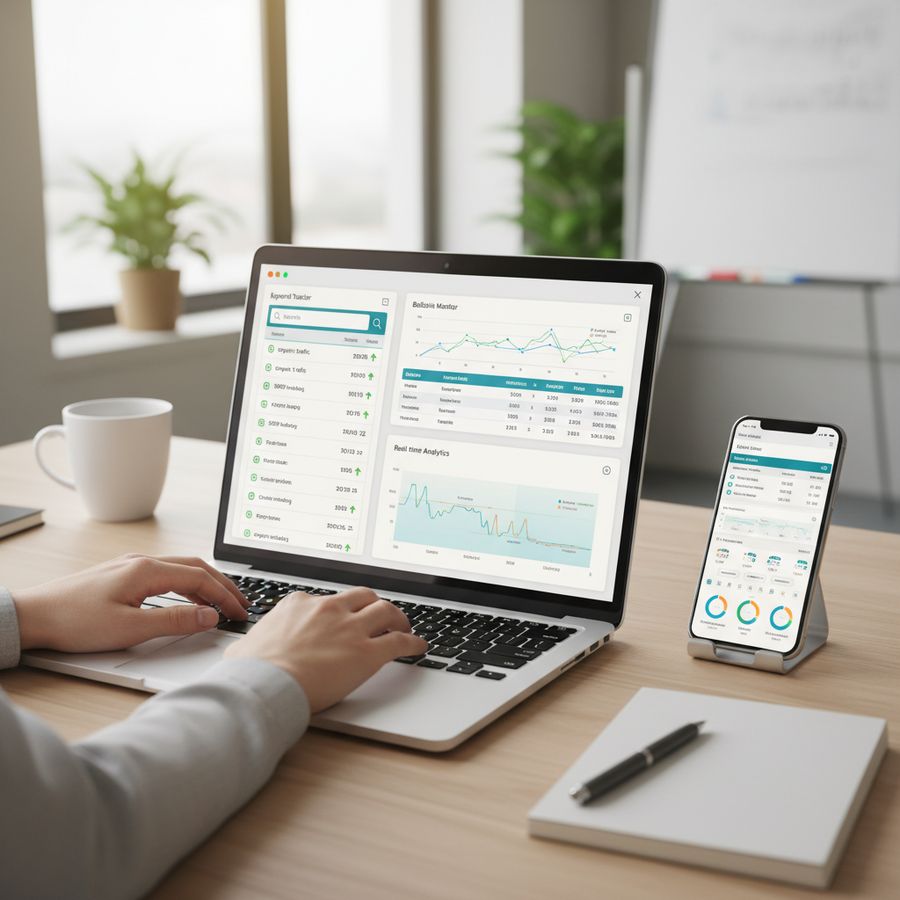Overview
In today’s fast-paced digital landscape, leveraging real-time SEO data can significantly enhance the effectiveness of your SEO efforts. Unlike traditional SEO approaches that rely heavily on periodic reviews and updates, real-time data provides instant insights into how your website is performing on search engines. This immediacy allows businesses to dynamically adjust their SEO strategies and respond swiftly to changes in search engine algorithms, competitor movements, and user behavior.
Real-time SEO data encompasses live metrics such as keyword rankings, traffic fluctuations, user engagement, backlink status, and site health indicators that update continuously. Accessing and analyzing this data equips marketers and website owners with the ability to make informed decisions faster, ultimately improving their website ranking and attracting more organic traffic.
One of the key advantages of using real-time data is the ability to spot opportunities and threats as they occur. For example, if you notice a sudden drop in rankings for a critical keyword, you can immediately investigate and implement corrective actions. Conversely, if a new keyword starts driving traffic, your team can capitalize on it by producing targeted content or strengthening internal linking.
Real-time SEO data transforms SEO from a set-it-and-forget-it task into a continuous, proactive process, enabling businesses to stay ahead in competitive markets. In the sections that follow, we will explore the importance of this data, the tools that facilitate its collection and analysis, and how to implement swift SEO updates to maximize your site’s performance.

Importance of Real-Time SEO Data
Understanding the importance of real-time SEO data is fundamental for any business aiming to optimize its online presence effectively. Real-time data provides an up-to-the-minute view of your website’s performance, allowing you to identify trends and react to changes immediately rather than waiting for weekly or monthly reports.
One of the primary benefits of real-time SEO data is enhanced agility. Search engines like Google constantly update their algorithms, which can impact your website ranking without warning. By monitoring your SEO metrics live, you can quickly detect performance shifts caused by these updates and adjust your SEO strategies accordingly.
Moreover, real-time insights help you identify user behavior patterns on your site, such as bounce rates, session duration, and conversion rates. This data reveals which pages are resonating with your audience and which require optimization. For instance, if a landing page experiences a sudden drop in traffic, you can promptly troubleshoot potential issues like slow loading times or broken links.
“Real-time SEO data empowers businesses to maintain a competitive edge by enabling rapid responses to search engine fluctuations and user trends.”
Finally, leveraging real-time data supports better resource allocation. Instead of investing heavily in long-term campaigns without immediate feedback, marketers can focus on tactics that show instant results. This dynamic approach leads to more efficient SEO updates and a higher return on investment over time.
Tools for Real-Time SEO
To harness the power of real-time SEO data, utilizing the right SEO tools is crucial. Modern SEO platforms offer a range of features designed to provide live insights into your website’s performance, enabling you to make data-driven decisions quickly.
Some of the most popular tools that support real-time SEO monitoring include:
- Google Analytics: While primarily an analytics tool, Google Analytics offers real-time reporting on website traffic, user behavior, and conversions, helping you track immediate changes.
- Google Search Console: Provides real-time alerts on site issues, indexing status, and search performance, allowing you to detect and fix SEO problems promptly.
- SEMrush: Offers live keyword tracking, backlink monitoring, and site audits to keep your SEO efforts aligned with current trends and competitor activity.
- Ahrefs: Known for backlink analysis, Ahrefs also provides real-time rank tracking and site health monitoring.
- Boostifai: An AI-powered SEO automation tool that delivers continuous on-page adjustments and content suggestions based on real-time data, making it ideal for business owners with limited technical skills.
Choosing the right combination of tools depends on your specific needs and technical proficiency. However, integrating these tools into your workflow ensures that you can track vital SEO metrics in real time and implement SEO updates without delay, keeping your website competitive and visible.

Updating SEO Strategies Quickly
One of the most significant advantages of utilizing real-time SEO data is the ability to update your SEO strategies swiftly and effectively. The digital marketing ecosystem changes rapidly, and a static SEO approach can cause missed opportunities or prolonged periods of underperformance.
When real-time data highlights a sudden dip in keyword rankings or traffic, you can immediately investigate the root cause. This might involve optimizing underperforming pages, revising meta tags, adjusting content, or resolving technical issues such as broken links or slow page speeds. Quick responses prevent long-term damage to your website ranking and maintain steady organic growth.
Additionally, real-time insights enable you to experiment and implement A/B tests more efficiently. For example, testing different headlines, calls to action, or page layouts can be monitored in real time, allowing you to discontinue ineffective versions and scale the successful ones rapidly.
“The key to successful SEO lies in timely adaptation—real-time data equips marketers with the agility to fine-tune strategies as market conditions evolve.”
Automated tools like Boostifai further simplify this process by continuously applying on-page improvements and content optimizations based on up-to-date data. This automation reduces the burden on SEO experts and business owners, providing a seamless way to keep SEO aligned with current trends without requiring deep technical expertise.
Impact on Website Ranking
The influence of real-time SEO data on your website ranking is profound. Search engines reward websites that are consistently optimized, user-friendly, and responsive to changes in the digital environment. Real-time data facilitates these qualities by enabling ongoing adjustments that improve site relevance, authority, and usability.
By promptly addressing issues like keyword cannibalization, content gaps, or technical errors, your website maintains a strong position within search engine results pages (SERPs). The consistent application of SEO updates also signals to search engines that your website is actively managed, fresh, and trustworthy.
Moreover, real-time monitoring of backlink profiles helps protect your site from harmful links that could negatively affect rankings. Identifying and disavowing toxic backlinks as they appear ensures your website’s authority remains intact.
Ultimately, the continuous optimization cycle empowered by real-time data leads to higher organic traffic, better user engagement, and improved conversion rates. These factors collectively contribute to sustainable and enhanced rankings over time, offering businesses a competitive advantage in their niche.
Case Studies of Real-Time SEO
Several businesses have successfully harnessed real-time SEO data to achieve remarkable improvements in their online visibility and website ranking. These case studies highlight the practical benefits of integrating real-time insights into SEO workflows.
For example, an e-commerce company used real-time keyword tracking to identify emerging trends in their niche. By rapidly creating content targeting these trending keywords and adjusting product descriptions accordingly, they increased organic traffic by over 30% within three months.
Another case involved a SaaS provider that employed automated SEO tools to monitor site health and fix technical issues immediately as they arose. This proactive approach reduced downtime and improved user experience, resulting in a higher conversion rate and better SERP positioning.
Marketing agencies leveraging real-time analytics have also reported faster campaign turnarounds and more precise targeting, enabling clients to outperform competitors consistently.
“Real-time SEO data not only accelerates performance improvements but also empowers businesses to innovate and stay ahead in competitive digital markets.”
These examples demonstrate how the integration of real-time data and automation tools can transform SEO from a reactive to a proactive discipline, yielding measurable and lasting results.
Conclusion
Incorporating real-time SEO data into your digital marketing strategy is no longer optional but essential for achieving superior website ranking and sustained organic growth. The immediacy of data allows for swift identification of issues and opportunities, ensuring your SEO strategies remain relevant and effective in a constantly evolving landscape.
By leveraging the right SEO tools and embracing automation, businesses can reduce costs, save time, and focus on their core passions while maintaining a competitive edge. Real-time data transforms SEO into a dynamic, continuous process that drives better decision-making and long-term success.
Start integrating real-time SEO insights into your workflows today to experience the transformative power of timely, data-driven optimization and keep your website ahead in the search rankings.
Leave a Reply